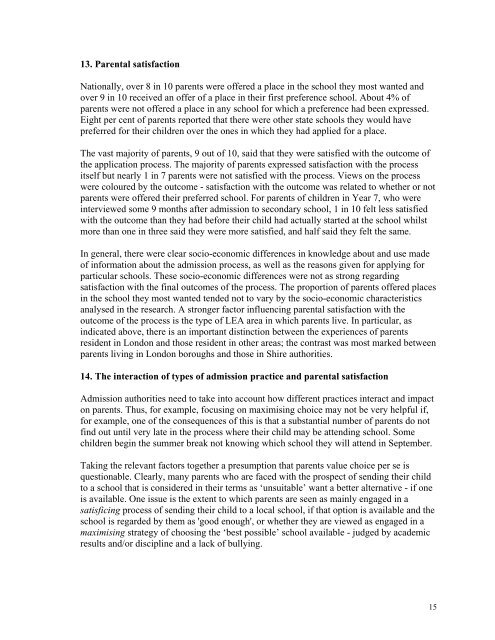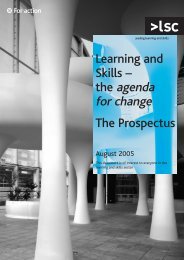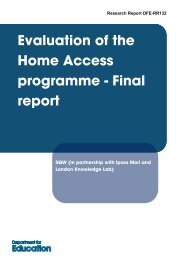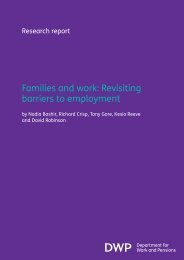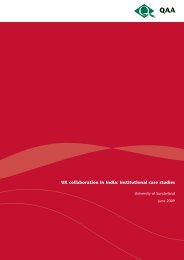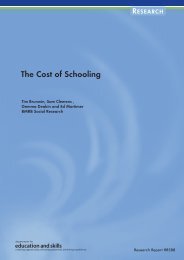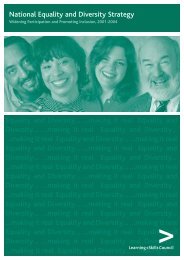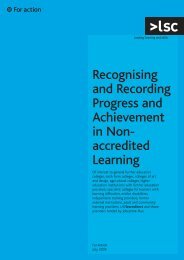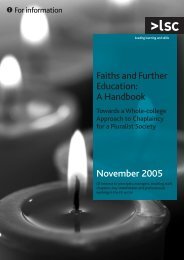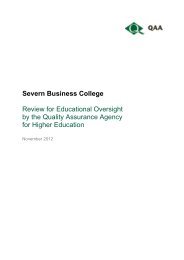Parents' Experiences of the Process of Choosing a Secondary School
Parents' Experiences of the Process of Choosing a Secondary School
Parents' Experiences of the Process of Choosing a Secondary School
Create successful ePaper yourself
Turn your PDF publications into a flip-book with our unique Google optimized e-Paper software.
13. Parental satisfaction<br />
Nationally, over 8 in 10 parents were <strong>of</strong>fered a place in <strong>the</strong> school <strong>the</strong>y most wanted and<br />
over 9 in 10 received an <strong>of</strong>fer <strong>of</strong> a place in <strong>the</strong>ir first preference school. About 4% <strong>of</strong><br />
parents were not <strong>of</strong>fered a place in any school for which a preference had been expressed.<br />
Eight per cent <strong>of</strong> parents reported that <strong>the</strong>re were o<strong>the</strong>r state schools <strong>the</strong>y would have<br />
preferred for <strong>the</strong>ir children over <strong>the</strong> ones in which <strong>the</strong>y had applied for a place.<br />
The vast majority <strong>of</strong> parents, 9 out <strong>of</strong> 10, said that <strong>the</strong>y were satisfied with <strong>the</strong> outcome <strong>of</strong><br />
<strong>the</strong> application process. The majority <strong>of</strong> parents expressed satisfaction with <strong>the</strong> process<br />
itself but nearly 1 in 7 parents were not satisfied with <strong>the</strong> process. Views on <strong>the</strong> process<br />
were coloured by <strong>the</strong> outcome - satisfaction with <strong>the</strong> outcome was related to whe<strong>the</strong>r or not<br />
parents were <strong>of</strong>fered <strong>the</strong>ir preferred school. For parents <strong>of</strong> children in Year 7, who were<br />
interviewed some 9 months after admission to secondary school, 1 in 10 felt less satisfied<br />
with <strong>the</strong> outcome than <strong>the</strong>y had before <strong>the</strong>ir child had actually started at <strong>the</strong> school whilst<br />
more than one in three said <strong>the</strong>y were more satisfied, and half said <strong>the</strong>y felt <strong>the</strong> same.<br />
In general, <strong>the</strong>re were clear socio-economic differences in knowledge about and use made<br />
<strong>of</strong> information about <strong>the</strong> admission process, as well as <strong>the</strong> reasons given for applying for<br />
particular schools. These socio-economic differences were not as strong regarding<br />
satisfaction with <strong>the</strong> final outcomes <strong>of</strong> <strong>the</strong> process. The proportion <strong>of</strong> parents <strong>of</strong>fered places<br />
in <strong>the</strong> school <strong>the</strong>y most wanted tended not to vary by <strong>the</strong> socio-economic characteristics<br />
analysed in <strong>the</strong> research. A stronger factor influencing parental satisfaction with <strong>the</strong><br />
outcome <strong>of</strong> <strong>the</strong> process is <strong>the</strong> type <strong>of</strong> LEA area in which parents live. In particular, as<br />
indicated above, <strong>the</strong>re is an important distinction between <strong>the</strong> experiences <strong>of</strong> parents<br />
resident in London and those resident in o<strong>the</strong>r areas; <strong>the</strong> contrast was most marked between<br />
parents living in London boroughs and those in Shire authorities.<br />
14. The interaction <strong>of</strong> types <strong>of</strong> admission practice and parental satisfaction<br />
Admission authorities need to take into account how different practices interact and impact<br />
on parents. Thus, for example, focusing on maximising choice may not be very helpful if,<br />
for example, one <strong>of</strong> <strong>the</strong> consequences <strong>of</strong> this is that a substantial number <strong>of</strong> parents do not<br />
find out until very late in <strong>the</strong> process where <strong>the</strong>ir child may be attending school. Some<br />
children begin <strong>the</strong> summer break not knowing which school <strong>the</strong>y will attend in September.<br />
Taking <strong>the</strong> relevant factors toge<strong>the</strong>r a presumption that parents value choice per se is<br />
questionable. Clearly, many parents who are faced with <strong>the</strong> prospect <strong>of</strong> sending <strong>the</strong>ir child<br />
to a school that is considered in <strong>the</strong>ir terms as ‘unsuitable’ want a better alternative - if one<br />
is available. One issue is <strong>the</strong> extent to which parents are seen as mainly engaged in a<br />
satisficing process <strong>of</strong> sending <strong>the</strong>ir child to a local school, if that option is available and <strong>the</strong><br />
school is regarded by <strong>the</strong>m as 'good enough', or whe<strong>the</strong>r <strong>the</strong>y are viewed as engaged in a<br />
maximising strategy <strong>of</strong> choosing <strong>the</strong> ‘best possible’ school available - judged by academic<br />
results and/or discipline and a lack <strong>of</strong> bullying.<br />
15


